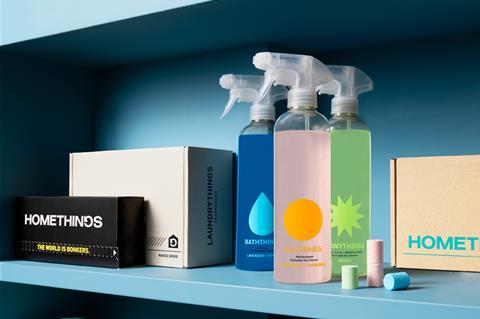
Startups in every industry are changing the way we work, live and play, challenging the status quo and innovating to meet some of the greatest challenges of our time.
Some are brilliant but bonkers, like Air Company, which is using carbon capture technology to turn air into jet fuel, vodka and perfume. Others, like Homethings, have solutions that just make sense. We realised cleaning products were 90% water, so we launched effervescent tablets that can be refilled with tap water at home.
And in consumer products, we’re not alone – our friends at Fussy have created refillable deodorants, Suri has created the first fully recyclable electric toothbrush and Petit Pli has created clothing that grows with your child.
These are all game-changing innovations that could have a huge impact on how we consume. For example, the UK uses tens of millions of heavy, water-based, plastic cleaning bottles every year. All that plastic, and the carbon emissions from transporting water, could be eradicated by using tablets and tap water.
For the innovators who bring these products to market, one of the biggest challenges is how to change ingrained consumer habits and behaviours with limited marketing budgets. This becomes all the more difficult with a cost of living crisis and macroeconomic turmoil.
The dangers in these circumstances are that innovation isn’t allowed to flourish, excessive greenwashing adds to ‘noise’ for the consumer, and the status quo prevails.
One of the world’s biggest polluters – Coca-Cola – has been announced as the headline sponsor of COP27. Meanwhile, in our category, the ASA is working overtime to clamp down on misleading environmental claims from behemoths like Persil and Dettol, who dine out on consumer confusion over woolly claims like ‘plastic neutral by 2030’.
Now, more than ever, we don’t have the time to allow that to happen. Resetting our relationship with consumption and transitioning to a circular economy is vital if we’re to avoid the impending climate crisis. And retailers are key to this conundrum. Choice is power for consumers, and innovative solutions with genuine impact need to be where consumers are shopping for them.
Recent Kantar data shows 29% of UK consumers are ‘eco active’, which means they are actively looking for more sustainable brands and products. This figure is forecast to grow to 60% by 2030. Consumers will increasingly vote with their wallets when given the choice.
Many ‘sustainable brands’ are affordable and accessible. A product can’t be truly considered game-changing if only the top 1% of consumers can afford it. For us at Homethings, being mainstream-affordable was a commitment from day one, which is why we benchmark to major brands like Ecover and Method.
Sure, it’s challenging as a small brand with low quantities and high costs in a period of high inflation, but making sustainability affordable is critical if we’re to drive large-scale behavioural change.
At times like these, most retailers will retreat to what they know: powerhouse, ‘cash cow’ brands that print money whilst tweaks to pack sizes and formats are window-dressed as “category innovation”.
But let’s not forget the environmental commitments retailers have made publicly. Morrisons announced plans to become the first ‘zero waste’ supermarket by 2025, Sainsbury’s has committed to zero waste by 2035 and Tesco has pledged carbon neutral by 2035. The only way they can meet these lofty public targets is by embracing innovation, instead of falling into the trap of optimising for short-sighted quarterly commercial targets.
If they do that, then when the economic cycle returns to stability and growth, they’ll be left behind by competitors who’ve taken longer-term views, backed innovation and delivered on their commitments.



















No comments yet